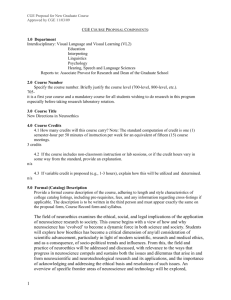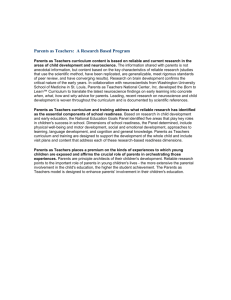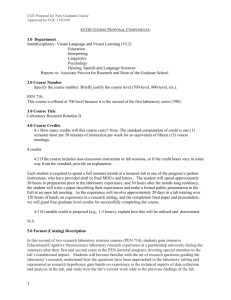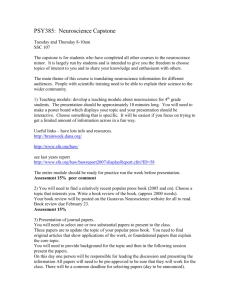PEN 704 - Proposal - Gallaudet University
advertisement
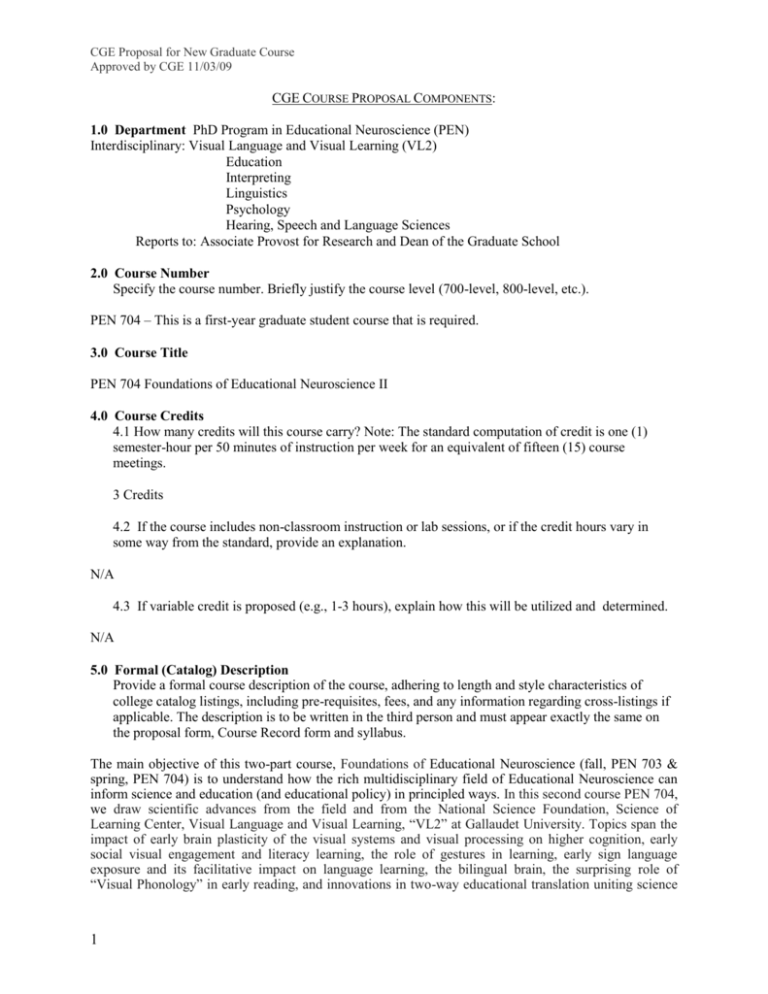
CGE Proposal for New Graduate Course Approved by CGE 11/03/09 CGE COURSE PROPOSAL COMPONENTS: 1.0 Department PhD Program in Educational Neuroscience (PEN) Interdisciplinary: Visual Language and Visual Learning (VL2) Education Interpreting Linguistics Psychology Hearing, Speech and Language Sciences Reports to: Associate Provost for Research and Dean of the Graduate School 2.0 Course Number Specify the course number. Briefly justify the course level (700-level, 800-level, etc.). PEN 704 – This is a first-year graduate student course that is required. 3.0 Course Title PEN 704 Foundations of Educational Neuroscience II 4.0 Course Credits 4.1 How many credits will this course carry? Note: The standard computation of credit is one (1) semester-hour per 50 minutes of instruction per week for an equivalent of fifteen (15) course meetings. 3 Credits 4.2 If the course includes non-classroom instruction or lab sessions, or if the credit hours vary in some way from the standard, provide an explanation. N/A 4.3 If variable credit is proposed (e.g., 1-3 hours), explain how this will be utilized and determined. N/A 5.0 Formal (Catalog) Description Provide a formal course description of the course, adhering to length and style characteristics of college catalog listings, including pre-requisites, fees, and any information regarding cross-listings if applicable. The description is to be written in the third person and must appear exactly the same on the proposal form, Course Record form and syllabus. The main objective of this two-part course, Foundations of Educational Neuroscience (fall, PEN 703 & spring, PEN 704) is to understand how the rich multidisciplinary field of Educational Neuroscience can inform science and education (and educational policy) in principled ways. In this second course PEN 704, we draw scientific advances from the field and from the National Science Foundation, Science of Learning Center, Visual Language and Visual Learning, “VL2” at Gallaudet University. Topics span the impact of early brain plasticity of the visual systems and visual processing on higher cognition, early social visual engagement and literacy learning, the role of gestures in learning, early sign language exposure and its facilitative impact on language learning, the bilingual brain, the surprising role of “Visual Phonology” in early reading, and innovations in two-way educational translation uniting science 1 CGE Proposal for New Graduate Course Approved by CGE 11/03/09 and research. One major objective is for students to learn how Educational Neuroscience can provide specific advances in the education of all children, particularly young deaf children. Students in this course will read research articles, participate in discussions, do a small research project, and present a final paper. 6.0 Prerequisites 6.1 List the prerequisites and/or co-requisites for this course. PEN 703 Foundations of Educational Neuroscience I 6.2 Provide a brief rationale for prerequisites and/or co-requisites, This is the second course (spring) of a 2-part (fall and spring) “Foundations in Educational Neuroscience” course for new graduate students that they will take in their first year at Gallaudet. 6.3 If prerequisites and/or co-requisites involve other departments of instruction, provide evidence of acknowledgement and cooperation from these departments (e.g. letters of support). NA 7.0 Rationale for proposed course 7.1 Why is this course being proposed? Provide a rationale. This is the second course (spring) of a 2-part (fall and spring) “Foundations in Educational Neuroscience” course for new graduate students that they will take in their first year at Gallaudet. The course is being proposed as the defining foundational course in the new PhD Program in Educational Neuroscience that is being submitted simultaneously with this proposal. At the most general level, this course (PEN 704) propels forward both Gallaudet University and university goals (at large) to provide its students with the most cutting-edge knowledge, healthy and lively analysis and debate, and advances in society. The present proposed Foundations of Educational Neuroscience course seeks to contribute to the advancement of such core university goals. 7.2 Describe any actual or apparent overlap with current course offerings. If other departments are impacted by this course, provide evidence of consultation with and support from those departments (e.g. letters of support). To the best of our knowledge, there is no overlap with current course offerings. 8.0 Grading System State whether letter-grade or pass/fail system will be utilized; if the latter, provide a brief rationale. This course is for letter grade only. The student grades are calculated according to their participation in and performance of their assignments described in section 11. 9.0 Course Characteristics 9.1 If the course is to be cross-listed (within a single department, or across more than one department), provide a rationale and full documentation of steps taken to assure such listings. 2 CGE Proposal for New Graduate Course Approved by CGE 11/03/09 NA 9.2 If the course is open to both undergraduate and graduate students, provide a rationale for doing so and explain any differences in requirements for undergraduate and graduate students. This course is intended to be only for PEN students (and other students with instructor’s permission.) 9.3 Explain how this course fits with the other department offerings. Is this course a required course (in which case it must be accompanied by a proposal for Change to Existing Program) or an elective course? This course is a required and pivotal foundational course in the new PhD program in Educational Neuroscience (which is being simultaneously submitted). 9.4 Describe the intended student-audience for this course. If substantial numbers of students from outside the department are expected to enroll in this course, provide evidence of support and cooperation from these departments in terms of enrollment and compatible scheduling. This course is designed for students in the Educational Neuroscience Ph.D. program. However, others may sign up with instructor’s permission. 9.5 What is the anticipated starting date for this course? How frequently and in which semester(s) will the course be offered in the future? How many sections of this course will typically be offered simultaneously? PEN 703 will be offered in fall 2013 (separate proposal attached). PEN 704 is planned to be offered spring 2014. Both courses are scheduled to meet once a week for 3 hours for the duration of the semester. Part 1 and Part 2 are envisioned as always being taught this way: 1 in the fall, and 1 in the Spring, and there are no plans to ever join them into one term. 10.0 Instructor Describe necessary instructor competencies and qualifications to teach the course. The new to-be-hired faculty member in the planned PhD program in Educational Neuroscience (to begin Fall 2013) is expected to teach this course. (A new faculty member has already been approved and budgeted.) The course requires an instructor who holds an earned doctorate degree, and who possesses experience and expertise in university instruction and research. 11.0 Course Format and Procedures Describe how the course will be conducted, in terms of class meetings and teaching procedures. For example, will the course be taught online only, or as a hybrid of online and classroom meetings? Will the course incorporate lectures, discussions, lab sessions, small-group or individualized instruction, practicum or field experiences, student reports or projects, competency-based modules, or other types of instructional procedures? There will be no material taught online. As per the teaching objectives, including the rigorous objectives for student learning, all students are required to come to class. New topics are introduced during the first part of the class in lecture, though interactive format , followed by an in-depth interactive discussion, and/or an in-class Mini Lab experience during the second part of the class consisting of very active student engagement with the material.. Students are required to attend 3 CGE Proposal for New Graduate Course Approved by CGE 11/03/09 classes and complete all readings, write 2 short essays and a final paper, and provide an in-class Presentation on time. 12.0 Evaluation of Course and Course Instructor Describe how course instruction and the course itself will be evaluated, including any long-term strategies for evaluating the course as part of the department offerings. The course instruction and the course itself will be evaluated at the end of each course by the students as per Gallaudet’s standard forms and procedures. The course itself will be externally evaluated by an external review committee that is led by senior scientists with much experience in the creation of university level PhD programs in the neurosciences one year after the new entire PhD program has been initiated (we have a MOU with the University of California, Davis scientists to do this led by their senior neuroscientist and Dean, Dr. Ron Mangun). 13.0 Resources Describe the immediate and future impact the offering of this course is likely to have on the department's personnel, physical, and financial resources. A new faculty member is being recruited, which has been approved and already budgeted. 14.0 Alignment of proposed course goals with those of academic program 14.1 Program mission statement The program’s mission is to lay bare the advances, and to advance, the exciting new multidisciplinary field called Educational Neuroscience—a discipline that is bound by two driving overarching goals: (i) to marry leading scientific discoveries about how children learn knowledge that is at the heart of early schooling (e.g., language, reading, number, science, social-emotional) with core challenges in contemporary education, and to do so in principled ways through “two-way” communication and mutual growth between science and society; (ii) to conduct state-of-the-art behavioral and neuroimaging research that renders new knowledge that is useable, and meaningfully translatable, for the benefit of society (spanning parents, teachers, clinicians, medical practitioners, and beyond). Educational Neuroscience at Gallaudet University provides a unique strength in, and contribution to, pioneering advances in the education of young deaf children. The new PhD Program in Educational Neuroscience also seeks to propel forward Gallaudet University’s goals to provide its students with the most cutting-edge knowledge, powerful critical analysis and reasoning skills, and utterly advanced knowledge of, and expertise in, research and its principled application (here, neuroimaging and behavioral research), which are vital to education and society. 14.2 Program Student Learning Outcomes List the Student Learning Outcomes for your academic program. 1. The students will acquire a foundational knowledge of the educational, neurological, behavioral and cognitive determinants, and sociocultural practices that impact all human learning, especially learning in the young deaf visual learner. 2. The students will be exposed to a range of specialized topics and principles and scientific methods and understand the ethical principles of research conducted with participants. 3. The students will develop knowledge of the meaningful and principled, mutually beneficial, twoway means and methods to translate scientific discoveries to education and education to science. 4 CGE Proposal for New Graduate Course Approved by CGE 11/03/09 4. The students will develop research skills and critical thinking by demonstrating the ability to conduct independent research leading to dissertation and publication. 5. The students will develop professional communication and technology skills. 6. The students will demonstrate increasing independence throughout the training period, and show a readiness for entry-level faculty research positions. 14.3 Course Student Learning Outcomes List the Student Learning Outcomes for your proposed course. Then in table format, using the template provided below, list the learning outcomes and show how the course and program SLOs align by placing checks in the appropriate cells. See chart below. 14.4 Learning Opportunities Briefly describe the Learning Opportunities (eg. assignments, projects, activities, reports, field experiences, etc.) designed to achieve the course Student Learning Outcomes. List them in table format, using the template provided below, and briefly state how they will be assessed (eg. what assessment methods will be used?). See chart below. 14.5 Assessment Methods Attach assessment tools used in this course (include grading scales, rubrics, checklists, etc.) to the syllabi accompanying this proposal. Do not attach them to the proposal itself. See syllabus and chart below. PEN 704: Foundations of Educational Neuroscience II Course student Learning Outcomes Student Learning Opportunities 1. Students will learn the core questions, principles, goals, knowledge domains, and methods of the new multidisciplinary field Educational Neuroscience. Class participation/discussion informed from assigned readings 2. Students will know and explain the principled and meaningful links between science and education through problems explored in and out of the class. Class participation/discussion informed from assigned readings, Short Essays, Final Paper, and Presentation of Final Paper Class participation/discussion informed from assigned readings, Short Essays, 3. Students will demonstrate the critical thinking, analysis skills, and knowledge necessary to conduct research 5 Assessment Method PLO 1 2 3 4 5 6 Participation in class discussion will be assessed using a rubric provided in the syllabus; paper and presentation will be assessed using the rubrics for written assignments and presentations x x x x x x Participation in class discussion will be assessed using a rubric provided in the syllabus; paper and presentation will be assessed using the rubrics for written assignments and presentations x x x x x x Participation in class discussion will be assessed using a rubric provided in the syllabus; paper and presentation will be assessed using x x x x x x CGE Proposal for New Graduate Course Approved by CGE 11/03/09 in Educational Neuroscience. 6 Final Paper, and Presentation of Final Paper the rubrics for written assignments and presentations

